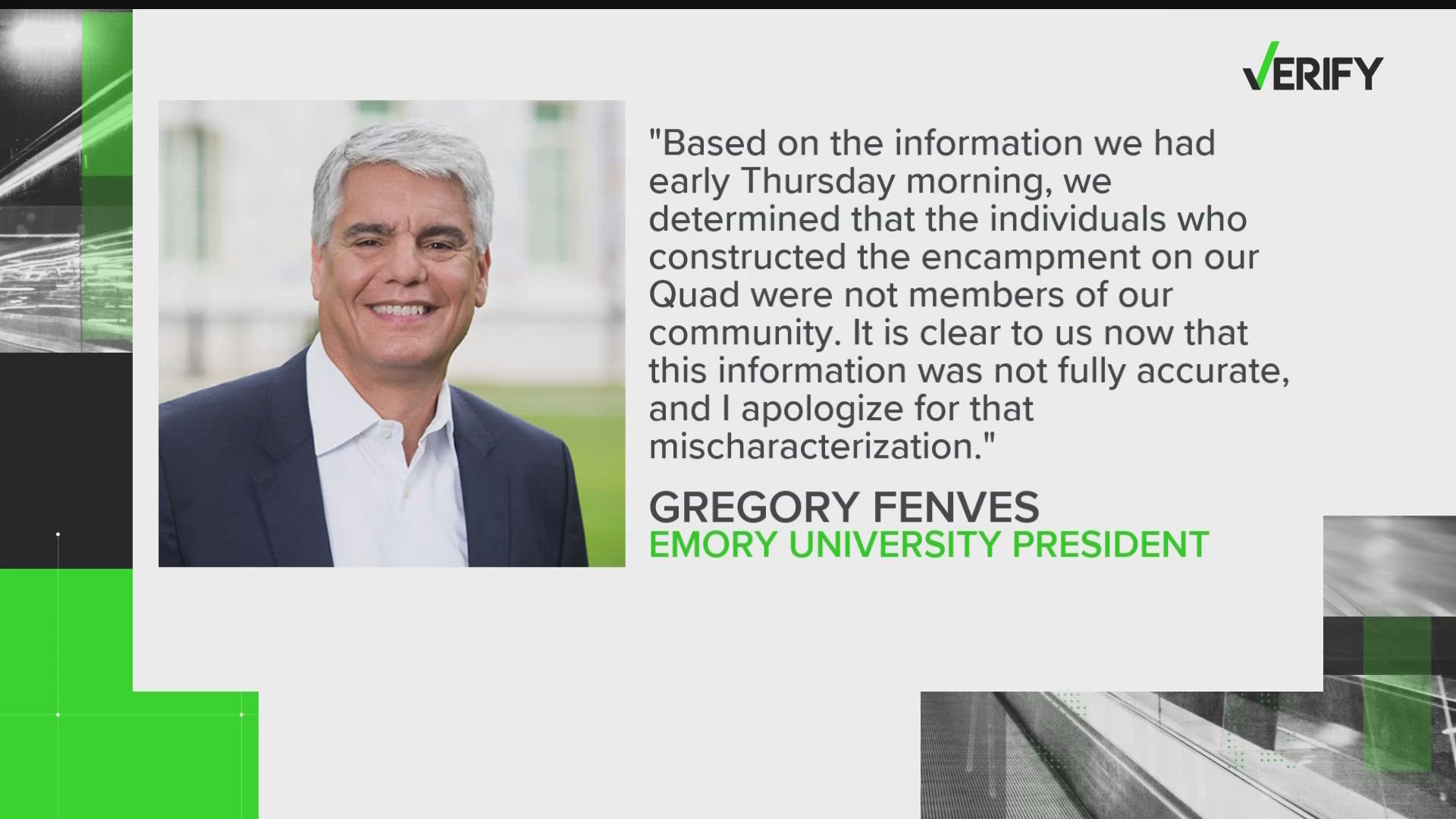ATLANTA — All across the country, daily protests are happening on college campuses. Students, faculty and outside activists say they are protesting against the Israeli-Palestine War -- pushing for their institutions to denounce the actions of Israel.
Metro Atlanta is seeing these same actions on the campuses of Morehouse University, Emory University and the University of Georgia.
As the protests continue, 11Alive is VERIFYING three online claims about the demonstrations occurring on Emory University's campus.
THE SOURCES
- Gregory L. Fenves, Emory University President
- The Emory Wheel
- Darryl Cohen, Partner, Cohen, Cooper, Estep & Allen L.L.C.
CLAIM ONE
Most protesting on Emory University's campus were not students or faculty.
WHAT WE FOUND
It is false that most protesting on Emory University’s campus were not students or faculty.
In a letter to campus from President Gregory Fenves, he said new information came out that this is not accurate.
“Based on the information we had early Thursday morning, we determined that the individuals who constructed the encampment on our Quad were not members of our community. It is clear to us now that this information was not fully accurate, and I apologize for that mischaracterization,” wrote Fenves.
11Alive reporters on campus also spoke to several people who were detained who were faculty members or Emory grad students.
In the statement, Fenves went on to write, “Let me be clear: I am devastated that members of our community were caught up in law enforcement activity enforcing the removal of the encampment.”
CLAIM TWO
A group of people vandalized part of Emory's campus.
WHAT WE FOUND
It is true that a group of people vandalized part of Emory’s campus.
President Fenves addressed this in a separate statement condemning the actions of these individuals.
“Late in the evening, as students and faculty were assembled on the Quad, several individuals rapidly approached Convocation Hall and spray-painted hateful messages on the building’s exterior walls. Several other structures were also vandalized. These individuals brazenly disrupted what had been a peaceful protest,” wrote Fenves.
Clement Lee, the managing editor for The Emory Wheel, was on campus as this happened and posted on social media that law enforcement arrived just a few minutes later. Emory Police Department is working with other law enforcement agencies to investigate.
CLAIM THREE
There is no right to assemble on Emory University's campus because it is a private institution.
WHAT WE FOUND
It is false that there is no right to assemble on Emory University's campus because it is a private institution.
Emory University has what it calls the “Respect for Open Expression Policy.” Within, it addresses the rights of the Emory community to “assemble and demonstrate peaceably while providing limits to activities that disrupt university operations or impede the rights of others.”
The policy lays out the limits on expression-related activity:
- Interfere unreasonably with the activities or rights of other persons. Factors that may be considered in determining whether conduct is reasonable include, but are not limited to, the time of day, size of audience, and noise level of a meeting, event or protest.
- Cause harassment.
- Use or threaten violence or force or encourage others to use or threaten violence or force.
- Cause injury to persons or property or threaten to cause such injury.
- Hold meetings, events or protests under circumstances where the health or safety of persons is endangered.
- Interfere unreasonably with the general operations of the university.
- Knowingly interfere with unimpeded movement in a university location. Examples may include preventing access to a building or blocking any entrances or exits in a way that causes safety concerns.
- Violate reasonable noise levels, such as but not limited to county noise ordinances.
- Violate any federal, state, local or other applicable law (e.g., gaining unauthorized access to restricted areas, refusing to leave restricted areas if instructed, defacing public and/or private property, etc.).

